We have compiled a list of our favorite games for ESL classroom teaching. This is a long and comprehensive list that has taken us years to gather so we have split it up into different sections. Looking for online and interactive ESL games? You can check out our FREE online resources for teachers here.
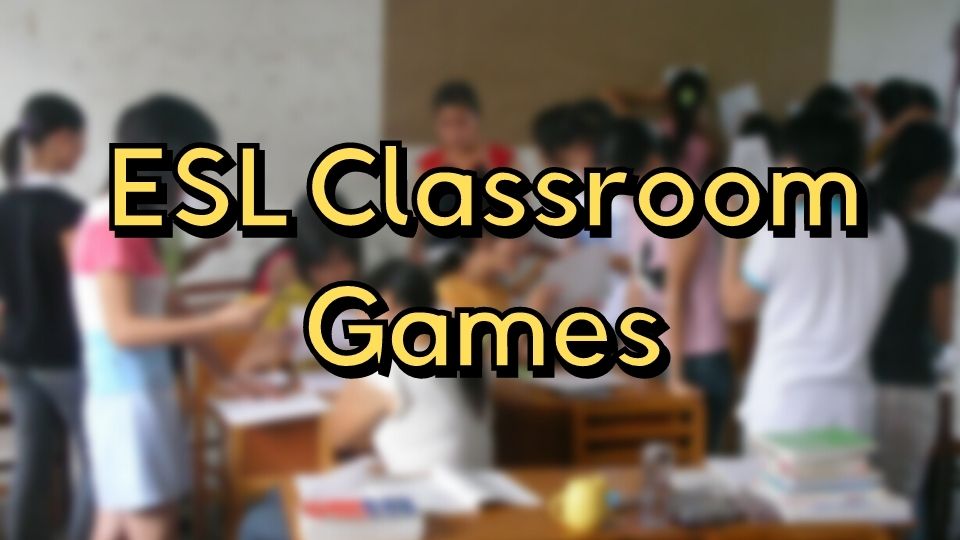
- Vocabulary Games
- Description Games
- Spelling Games
- Active Games
- Communication Games
- Memory Games
- Acting Games
- Card and Dice Games
- Phonics Games
- Mini Whiteboard Games
Vocabulary ESL Classroom Games
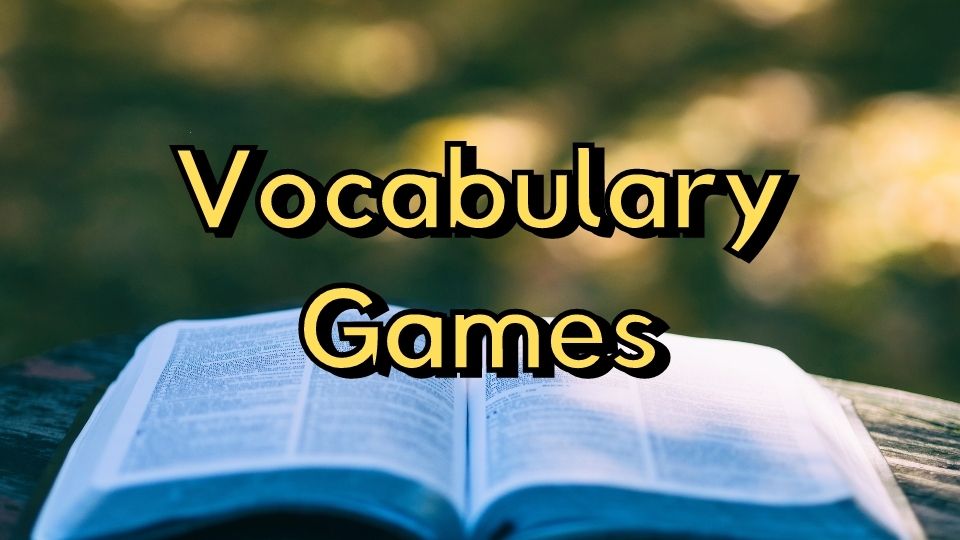
There are a few short forms in this list
- ESL = English as a Second Language
- WB = whiteboard
- S = student
- Ss = students
- T = teacher
- Qs = questions
Dictionary / Pictionary
Students make their own dictionaries, using pictures from magazines or their own drawings. Can be organized alphabetically or by theme.
Bring Me
In teams, pick one S on each team to be the statue. T says “Bring me…” (10 pencils, 6 erasers, etc) and students get it and give it to their statue until one team’s statue cannot hold any more objects.
BINGO
Can play with any category, Ss can draw Bingo cards or can print out. See Head Teacher for Bingo sheets.
Variations:
- Can use pictures for young learners.
- Teacher does not say next word until class is silent.
- Divide BINGO into categories, e.g. under the B write animals, I write long A words, etc.
- Go around the class and students call out a word from their bingo card.
- Higher classes-Ss must choose a letter and say a sentence. Sentence structure and Capital/ small letters.
Free Crossword
Draw a grid on the whiteboard, and students fill in with some words (in same category, spelling pattern, whatever). Fill in the remaining spaces, and students can solve the word search on the board.
Stop the bus!
Write categories on board, then a letter. Race to write a word for each category starting with that letter. When you finish, shout “stop the bus!”
Make a word search
See above, but give a grid worksheet to students to make their own word searches. They can give word lists to help or make it harder without. Students can trade sheets to solve.
Mastermind (like the game)
Think of a 4-letter word. Students guess one word, write it on the board. Write next to the written word – “O” for correct letter in correct position, “X” for correct letter in wrong position, nothing for wrong letters. Keep going until students find patterns and guess correct word.
A-Z Words
Students must quickly give words in alphabetical order, can go in a circle or random order. Variation: Students have to say a word that starts with the last letter of the previous word, e.g. ‘apple’ ‘egg’ ‘goat’.
Collocations
On board, write word with blank either before or after. Elicit collocations (word or phrase commonly used with another word or phrase). Eg. _____ TV (colour TV, portable TV) or Pencil _______ (pencil crayon, pencil sharpener)
Scattergories
Think of 5 topics (animals, sports, jobs, etc.). One student starts to say the alphabet until another student says stop. Then all students write one word for each topic, beginning with the last letter said. When someone has all five words, all students stop writing. Each student gets 5 points for each word, or 10 points if no one else thought of that word.
Tic Tac Toe
Draw a 9 square Tic Tac Toe board and in each square put a picture. Teams must say the name of the picture before they can put an X or an O. Or, before they put an X or an O, T asks them a question about the picture and they must answer correctly. Variation; teacher can write a question in the square or a command (say 6 long a words/ 7 colours etc.)
Calendar
Draw a grid for a month with days and numbers. In teams, students pick a square by saying day and date, eg May fifteenth. Then must answer a question to win the square. Trying to make a pattern, line of 3 stars, or whatever. (tic tac toe style)
Circle game
Use vocab cards. Ss stand in a circle T stands in the middle and shows one S a card. If they say the word right, they remain standing. If they get the word wrong, they sit down. Continue around the circle. Last one standing wins.
Switch sides
Ss sit on one side of the room. Use vocab cards. One S must try to read the card. If they answer correctly, they go over to the other side of the room. If they do not answer correctly, show the card to another S. The last S is a monkey.
What’s missing?
Draw stuff on the board (words, pictures, letters, etc.) or place objects on the table. S leaves the room. Others remove something. S returns, class asks “What’s missing?” Ss guess. Can practice short questions/answers. Is it…? Yes/No.
Two lines
Use vocab cards. Ss make two lines. You show a card or ask for a word from the front two Ss. The first S must say the word correctly to go to the back of the line. This process is repeated until the first person to read is back at the front. The first team to do this wins the round.
Word Association
The teacher starts the game by saying a word, such as “Hotel”. Ss must then follow with associated to the previous word. If S can’t answer (5 second limit) he or she must stand up. The last student seated is the winner. If the association is not obvious, the student is asked to explain the association
Pass the Paper
T writes something at the top of scrap pieces of paper and gives one paper to each student. Set goal for the number of words, yell “GO” and students write until you yell “Stop, CHANGE” and they pass the paper to the person next to them in a circle. Continue faster and faster.
Brainstorm chains
Students write lists of words for a category (short A, animals, adjectives etc); cut up and make paper chains.
Word Pictures
Write sentences or stories subbing pictures for some words, then another students fills in the words.
Colours with Lego
Teacher asks for “Give me a green Lego” then students add what is asked for to a basket, or remove.
Steps game
Use vocab cards. Ss line up against the wall in the back of the class. T tells them to take one step forward. You ask them for a word or show them a card. If they answer correctly, they can take one step back to the wall. Steps can be increased to two or three steps forward, requiring as many steps backward to finish the game.
Categories
In circle, everyone sits with hands palms up on knees. Teacher starts by saying a word (ie “cat”), and clapping hands in direction of next player. That student then says another word from same category (animals), go around circle. Students can change category, which changes direction of play. Variation: a 5-1 countdown and No Repeats or you’re OUT!
Flash Card Circle
Sit in a circle. Pair students up and give each pair 5-10 flashcards. 1 S1 asks ‘what is it?’ Or ‘Is it a ________________?’ (‘yes, it is/not, it isn’t’) S2 answers. When the pair is done the flashcards rotate to the pair on the right.
Musical Ball game
Have students sit in circle with a ball and music ready to play. Teacher calls out a category (animals/months…). Play the music and students pass the ball. When the music stops the person with the ball says something from that category. This ESL Classroom Game is great for warm-ups or for classes when you are trying to figure what level the students are at and what they know.
Board Race
This can be used to teach almost anything: students race to the white board and write the word/ 1st letter/ last letter/ draw a picture that the teacher says. Variation: 2 teams write the alphabet on the board and have to fill in a word for each letter of the alphabet, you can use a category (e.g. fruit, animals, English movies)
Memory
The 1st students says ‘I like tigers’ 2nd student says ‘I like tigers and monkeys’ and so on each student adds another item to the category. If the students cannot remember they are out- or if they repeat and word. Any category can be used (e.g. sports/ food/ animals/ clothing).
Accuracy Ball Throw
Write words on WB. ex. long A words. S line up in 2 teams behind a table. First 2 Ss have balls. T says a word. ex. cake. Ss throw balls and whoever is closest gets a point.
Ladders
Ss sit in two rows facing each other with their feel touching. The T gives each pair a word and when their word in called out, they must race down the row, around the outside and back down the middle. The first one sat back down gets a point for their team.
Pairs with ABC Flashcards (practice plurals)
Like normal pairs but if the S turns over a pair, they must state the singular and plural to get the cards (ex. 1 girl, 2 girls)
Odd Man Out
List 4 words (on board, in notebook, wherever) and students choose the odd man out, and give the reason why. E.g. man cat dog bag (dog doesn’t have short a sound) Snake leg pencil eraser (eraser isn’t long)
What’s this?
Draw part of a picture on the WB. Ask “What’s this?” Each S gets one guess per round. Draw more and ask “What’s this?” Ss must say “Is it a…?” When a S guesses correctly, they can draw.
Descriptions Games for ESL Classrooms
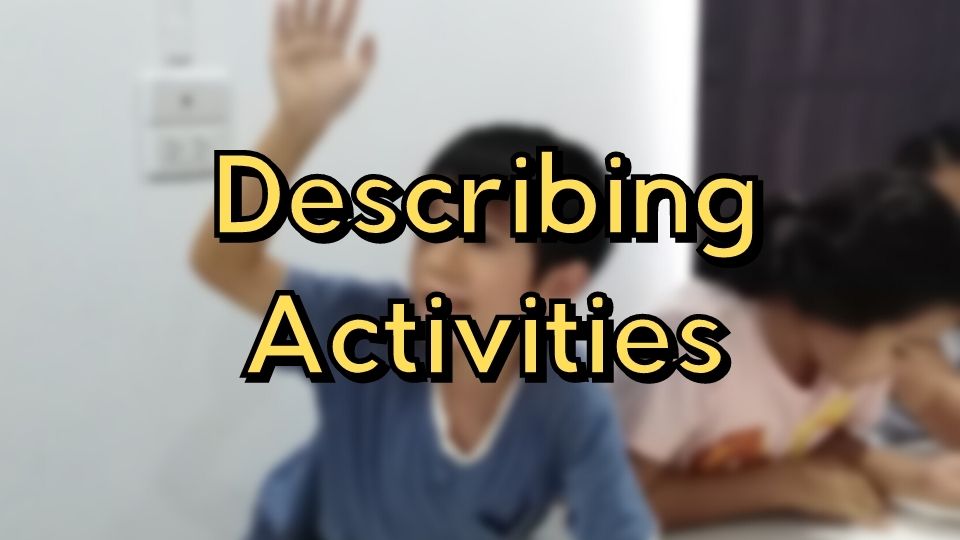
“I’m a Martian”
Tell students that you come from Mars and know nothing about life or things on earth. Choose an everyday object (pen, book, shoe, etc.) and ask students “What is this?”(“It is a pen”). Students must talk about the object and explain what it is used for, when and where you use it, etc.
Magazine Photos
Provide random magazine photos to each student. Give few minutes for the student to make up a story for the picture, being as creative as possible. You can specify the tense (what happened?, what is going to happen? What is happening?). Students must tell the story to the class and classmates will ask follow-up questions.
Close your eyes and draw
Ss close their eyes and draw what T describes, then take turns describing things for classmates to draw.
Draw my picture
Find a picture (magazine, photo, textbook). Students ask questions to get mental image of picture. Can either have students draw what they think, describe what they think, or show the picture to see how right/wrong their image was.
Draw and pass
Every S gets a blank paper and T gives directions e.g. “draw a big head”, then pass the paper, “draw long, straight hair”, then pass the paper. Continue until students have their original paper and they can name the creation. Have students call out the directions.
Art Critic
Place random pictures around the room. Ss look at each and write down words to describe it (colour, shape, emotion, etc.). Make a class list for each picture of general observations. Then each student chooses one of the pictures and writes a detailed description, including a story of what’s in the picture, and a title.
Haiku
Students write a poem that has 5 syllables in the first line, 7 in the second and 5 again in the last. (Obviously, you can make your own rules.)
Connecting letters
Students write sentences where each word begins with the first letter from the word before.
Ex: Jesus says suckers suspect telepathic communications shower rejoice.
Monsters
Use monster flash cards, first the teacher describes one monster and the students guess which one. For advanced students they can pick and describe their own monster, and other students have to guess which one they are describing.
Variation: for younger students, teacher holds up the flash cards and asks ‘how many (body part)’ ‘what colours is it’s (body part)’
Variation: line up against wall, each Student has a card and moves forward when card is described. “I’ve got 3 red eyes” etc
Give me…
Have flashcards of different colours with letters on them. Distribute them randomly. Start off by saying, “Give me the red R.” S gives the teacher the red R. Then they say, “Give me colour letter.” and so on.
ESL Spelling Classroom Games
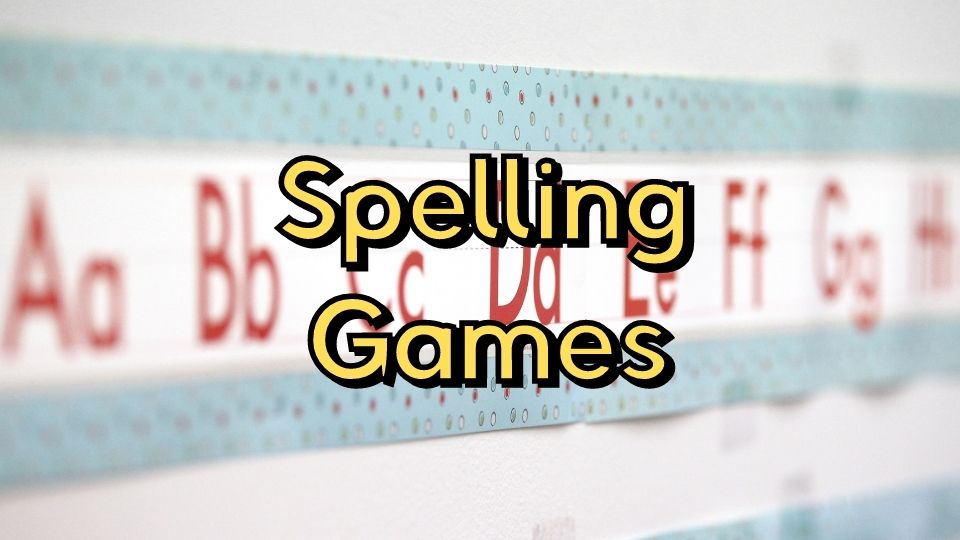
(Crocodile) Hangman
Hangman, but with steps to an alligators mouth (or any animal students think of). Teams: get points for guessing letters, lose points if no letter. (Wheel of Fortune rules)
Boggle
T draws up a 4*4 grid and fills with random letters. Ss have 10 minutes to write as many words from the grid as possible. Can be different rules. Beginner: any letters any amount of times. Advanced: letters must be adjacent to previous letters in the word. Give points for the length of the word.
Spelling Game
In teams each S has the letters of a word in mixed up order. They get in order to make a word, and say word: team with shortest time wins.
Spelling race
Teams race to spell a word as T says it. Points for the fastest correct spelling.
Flash Spelling Race
Students spell the word the teacher says in teams using ABC flashcards. First team=3 pts, second team=2 pts etc.
Scrambled words/sentences
Good for warm up. Give scrambled words (banana = nbaaan) or sentences on board and students must unscramble in teams or individually on paper
How Many Words?
T provides a long word on the wb and students must find as many other words with the letters of the first word (eg. CHRISTMAS- sit, cat, most, etc.)
Direct Spelling
Spell words on WB with letters that actually spell that word (eg appull for apple) and students correct the spelling.
Fast Words
Ss is arranged into rows. The first person in each row is given a marker. The blackboard is divided into sections per team.
T calls a letter and the students must write as many words as they can, starting with that letter, in the allocated time. Next, the second member gets the marker and goes to the board and the teacher calls out a new letter. The team with the most correct words is the winner.
Final Answer
Two teams, one S from each team comes to the board. Teacher says a word and kids write it on the board. They check with their team to see if it is right. When finished they raise their hand, and give their final answer
Last letter
T says a word to the first S. S must say a word beginning with the last letter of the previous word. In a circle or can choose by throwing a ball.
*Wheel of Fortune* Spelling Game
Like in Hangman, a puzzle (word or sentence) is written on the WB. The alphabet is written across the top of the WB. Consonants are worth 100 points, but vowels cost 200 points. In teams, students must correctly guess a letter to earn a guess of the puzzle. Each turn they get one letter and one guess only. If they solve the puzzle, their points from that round go into their Totals pot.
Letter/Animal Match
Good for beginning Ss. Write the A,B,C’s on WB. Give each S an animal flashcard. Must match the animal to the letter. If you put sticky tac on the backs of the flashcards, the Ss can put them directly on the WB.
Active ESL Classroom Games
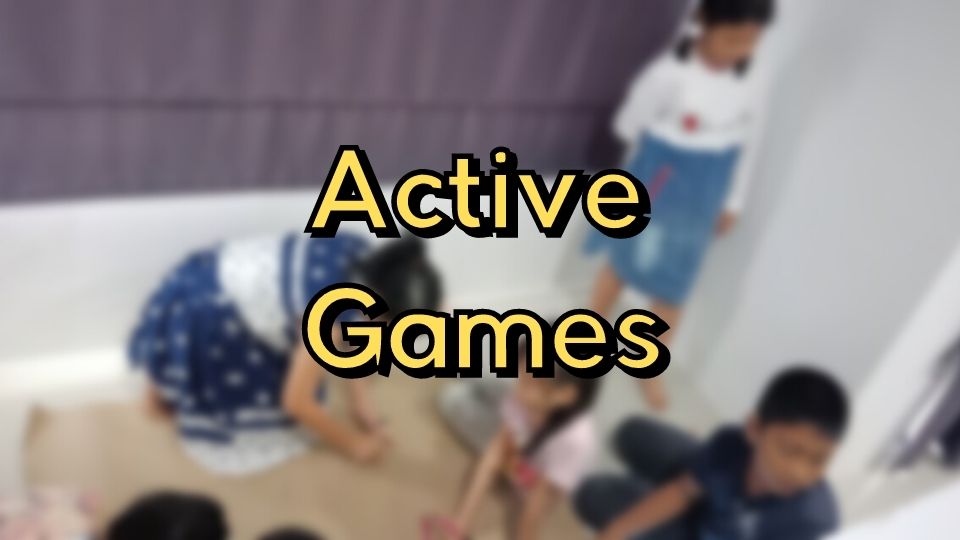
Cat, Cat, Dog (Also known as Duck, Duck, Goose)
Ss sit in a circle, one S walks around the outside and says ‘cat’ to each S. When the S says ‘dog’ next to one S, they chase them around the circle to sit down first. Can be used for any two words e.g. colours, shapes etc.
Lion and Sheep
Ss stand in a circle and hold hands. One S is inside the circle (sheep). One S is outside (lion). The aim is for the lion to catch the sheep. The circle must try to stop the lion from getting inside or out. If the lion gets in, the sheep must say a word from a chosen category to be let out, and vice versa. When the lion catches the sheep, the game is over.
21
Ss sit in a circle and count to 21 in order. S number 21 chooses a number (0-21) and replaces it with an action. Continue until all numbers are replaced with actions.
The Famous Ball Game
Ss line up along one wall. Decide on a category – e.g. colours – T shouts a word and Ss must run across the room if the word is a colour. T throws the ball as Ss run from one side to the other. If a S is hit they are out. Last S wins.
Variation: Boys are colours, girls are animals, face each other. T says a sentence, “I like red dogs” boys and girls race across avoiding being hit by ball. As students are “out”, they can take turns saying sentences, too.
Maths game
Lay two sets of number flashcards out on the table (0-20). T says sum (‘what is three times 2?’), Ss must hit the correct number flashcard first.
Team task race
In teams: Ss race to the board, T assigns a task (e.g. draw a cat, spell a word, etc.). Each team that completes the task correctly gets one point; the first one done gets two.
Reading card game
Throw a stack of word / flash cards onto the floor. Ss run and pick up a card, run over to you and say the word. If they say the word correctly, you slap their hand, they drop the card and run out to get another card. Variation: put the cards down in one long line. From this one line, the Ss run to pick up cards.
Simon Says
Can let Ss give the directions.
Hopscotch
Arrange flashcards around the room, Ss hop from flashcard to flashcard and pronounce words/numbers along the way. Shortest times win.
Bus Game
Make seats into rows for each team. T holds up flashcards or writes words on the board. Two Ss in front call out the word. First to get it goes to the back of the bus, rest of the kids shift forward. First team to complete cycle wins.
Grab
Two teams. Each team sits against one wall. Flashcards are in the middle face up. One S from each team runs to get the correct card. Team that gets it gets a point.
Reading and Pronunciation Game
Two teams at the back of the room. T writes a word they do not know on the board. When Ss think they know the word, they run to the board. First to touch board can say word.
Bowling
This is just a fun game in which the class is split into two teams, each team lines up and gets a cup which they must try to knock down with a ball. Every time the ball hits the cup the team gets a point. Team with most points wins.
Variation; Use plastic bottles, on the bottom of two write DANCE and SING a SONG. On the rest of the bottles write numbers 1-9. On the white board write 1- say 7 animals, 2- clap your hands e.t.c. (Using any categories you like). Two teams play against each other for points; whichever team knocks over the bottles the other teams must carry out the commands/ assignments.
Be a…
Action game where the teacher calls out an animal/ vehicle/ profession and the students all act it out. – This is good with energetic younger learners. Variation: Teacher holds up animal/ vehicle/ profession flash cards and students call out the word and then do action.
Verbs
Teacher says a verb (such as: run/ hop/ skip/ walk e.t.c.) and students act it out ‘everybody (verb)’.
Touch Game
Teacher says ‘touch _____’. Students race to touch what the teacher says. This is good for teaching colours/ body parts/ classroom vocab/ clothing- basically everything that you can see in your classroom.
Chair Game
Students put the chairs in a circle –one less chair than students. The person without a chair stands in the middle and says ‘I have _____’ ‘I am wearing ____’ ‘I (don’t) like _____’ ‘I am _____’ ‘I come from _____’ ‘My birthday is in ______’ e.t.c. If the sentence is correct for the student they must get up and swap chairs. The person without a chair then says a sentence. The aim of the game is not to be in the middle.
Ball in the Bag
Give Ss a shopping bag. Have them stand by a large box of plastic balls. Say, “Give me # colour balls.” Ss put the correct number and colour of balls in the bag.
Silent Ball Throw
No English is spoken but it’s a good calm down or camp game. S stand in a circle and pass a ball around. If they drop the ball, they are out. If they speak, they are out.
Beach Ball Keep Up
Good for really young Ss. Keep a beach ball or balloon in the air by hitting it. Everytime it is hit, count. When the ball hits the ground, start over.
Relay Races
Write instructions on the WB. Split students into teams, first to complete wins. Good for prepositions.
Harry Potter
2 Ss are Voldemort. Other Ss are HP. Vs must freeze HPs by touching them. HPs can unfreeze HPs by touch. When Vs freeze all HPs game is over. No English but a good reward.
Sleeping Lions
No English but used to calm Ss down. Ss lie down pretending to be sleeping lions. If they move or laugh, they are out.
Boxball/Football
Ask Qs to get a shot at the goal. Let Ss run after a while.
Communication Games
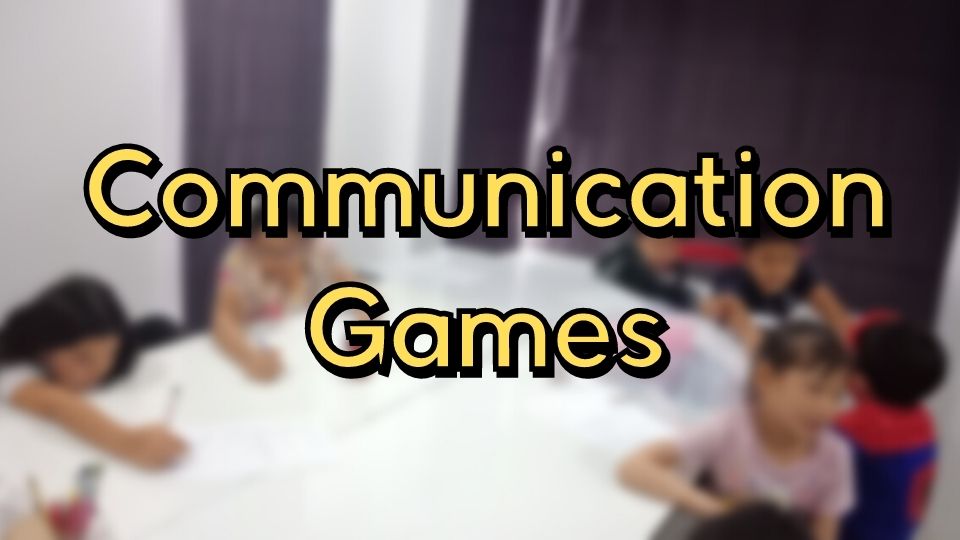
Find someone who…
Ss mingle around the class to find other Ss who have done certain things (e.g. ‘find someone who watched TV yesterday’). Ss must form questions in English and get a name for each question.
Paper conversation
Students have a conversation using only scrap paper. Instruct them “do not speak, find a partner, have a written conversation”. After a few minutes, students can continue their conversation orally.
5 things
Students work in pairs and find 5 things they have in common. Can either ask questions (do you have a sister?) or make statements (I have a sister, do you?).
2 truths and a lie
Students write 3 statements about themselves, 2 are true and 1 is false. Students share their statements and class guesses. T can write up guesses in chart on board.
Chain reaction
Ss sit in a circle. First S asks question to second S. Second S replies, then asks third S etc.
Scruples
Make situation cards e.g. ‘Your friend has stolen a car. Do you call the police?’ Divide the class into 3 groups: A yes team, a no team, and a panel of mediators. The mediators draw a card and read it, the yes and no teams make and present arguments for and against. The mediators decide which is the stronger argument.
I Spy
‘I spy with my little eye, something that is …’ (colour / shape etc.) or can use first letter of the word.
Telephone Game
T or S whispers a phrase or sentence to the next S and it is whispered to each student one by one. Last student must say the sentence. Two sentences can be sent around the circle in opposite directions.
Telephone Game (rows)
Ss in two lines, the sentence is whispered to the first student, who passes it down the line. The last student must run to the whiteboard and write the sentence. For lower levels, words can be used.
Flashcard Pix (higher level class)
Using flashcard pix from Elementary Communication Games or any other fairly random yet evocative pix to inspire students to write a short creative story in past/present or future tenses. Or each student gets one picture in a related series, says a sentence, and next continues the story.
Who Am I?
One S thinks of a person / animal / place. Other Ss ask yes / no questions to find out what / who it is. Can limit the number of questions.
Variation: ‘What’s my fathers job?’ Students ask questions such as ‘does he work in an office?’
Who Am I? (Individual)
Ss write the name of a well known person on scraps of paper which are shuffled and handed out (students cannot look at their papers). Papers are taped to each S’s back. Ss roam the class asking yes/no questions of their classmates. Set a limit of questions (3-5) for each student so they don’t stay with the same classmate the whole time.
R and S Chain
Ss in team lines. T writes a word on a mini whiteboard and shows it to the first S in line. They read the word and repeat it to the next person in line, gets passed down and the last person has to write it on the board.
Guess who
1 Student is blind folded, he spins around, when he stops the person in front of him must answer a question (from the blind folded student) e.g. ‘how old are you?’ The blind folded student then has to guess the student that answered the question.
Shopping
Have various food flashcards on the WB. Give Ss 5-10 dollars. Have them properly ask to buy a certain item. Have Ss switch roles from shopper to shop-keeper.
Question Bounce
Using either common questions or creative, interesting questions (depending on level) Ss ask each other questions. First S asks second, who answers then asks third, etc… bouncing.
Questions Challenge
2 students ask each other questions in turn until one is stumped, then the winner challenges the next player.
20 Questions
S have as many questions as there are students to guess what the T is thinking of. Good practice for Does it have? Is it? Can it? question and answer structure.
Fortunately/unfortunately
Students make up a story by adding sentences, moving from good to bad luck with fortunately and unfortunately. Can give students a topic or starting point. E.g. Yesterday we went to Bangkok. Fortunately, we had air-con tickets for the train. Unfortunately, we lost our tickets. Fortunately, my mom bought us new tickets….
Memory Games
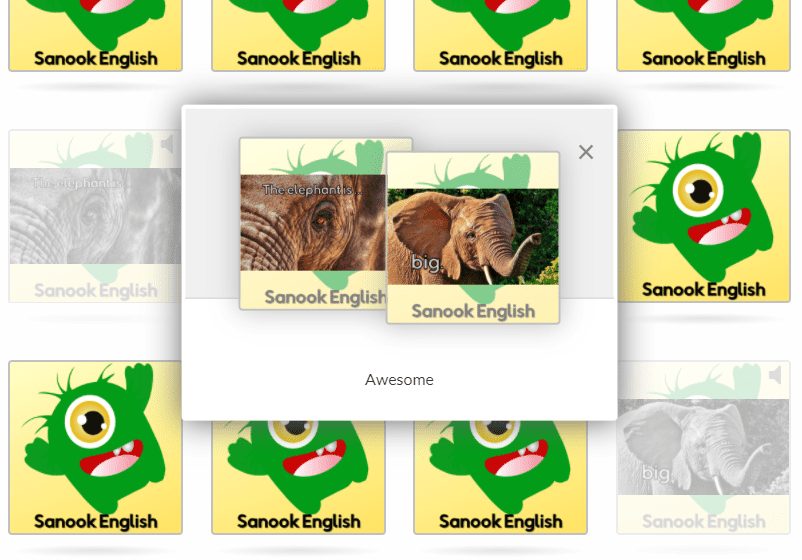
Word code
T writes a paragraph on the board, and read it together as a class. Erase the verbs and replace with a star. Class reads the paragraph again, with the missing verbs. Next replace the adjectives and replace them with a circle; the class reads again saying the missing verbs and adjectives. Continue to remove the nouns, adverbs, etc. replacing them with different symbols, each time having the class read the entire paragraph. Be sure to write a key to the symbols (*=verb, 0=adjective). When all the words have been replaced with symbols, have them write the whole paragraph.
Memory Sentences
Ss sit in a circle and T starts with “I’m going shopping. I’m going to buy a pencil. The next student says “I’m going shopping. I’m going to buy a pencil and a notebook” and the game continues around the circle.
Many variations: qualities in friends, ‘if I was a millionaire…’; ‘on a perfect day…’; on a deserted island; ‘if I was president…’; ‘___ makes me happy’;‘I want to learn about…’ etc.
Music Listening
Play a song, or part of a song, 2-3 times, then have students write down what they can remember.
Sentence Story
Ss write a story (T or Ss can record on paper or whiteboard) with each student contributing a sentence. When finished, read the story aloud once, and then hide or clean the whiteboard. Students must retell the story from memory. Make it harder by having them retell the story in reverse.
Try a Memory Game Online
Acting Games
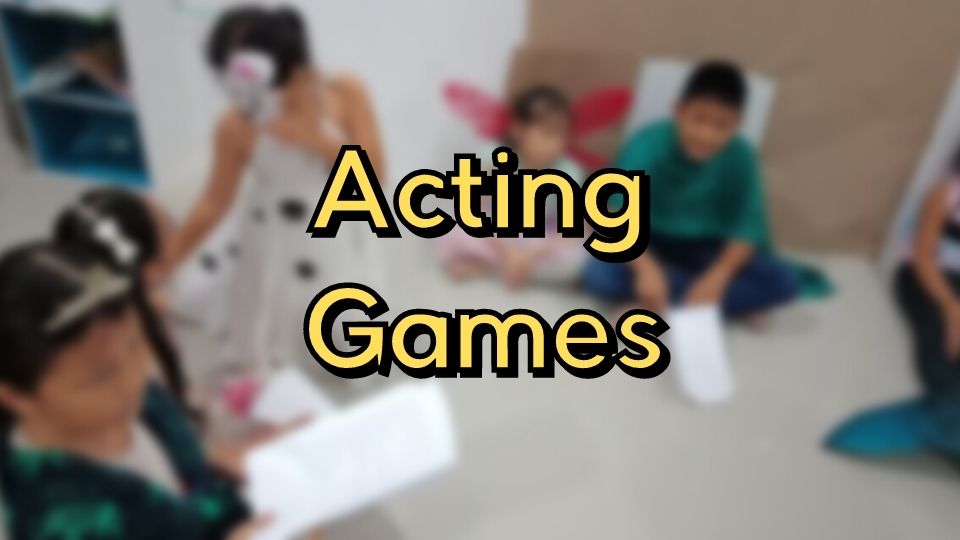
Ed/ ing
Students work in pairs. Give each pair ‘_ed’ / ‘_ing’ combination (e.g. bored / boring). The pair acts out a skit – one student is bored, the other is boring. The class guesses which is which.
Darling If You Love Me
In a circle, try to make each other laugh by saying “Darling if you love me, won’t you please smile?” students reply a) laugh b) “Sorry I don’t love you.”
Charades
Many variations: actions verbs; shapes; emotions etc.
Ha Ha Ha game
Good warm up that gets students laughing: 1st student says ‘ha’ second student says ‘ha ha’, third says ‘ha ha ha’ and so on. If a student laughs they are out.
Card and Dice Games
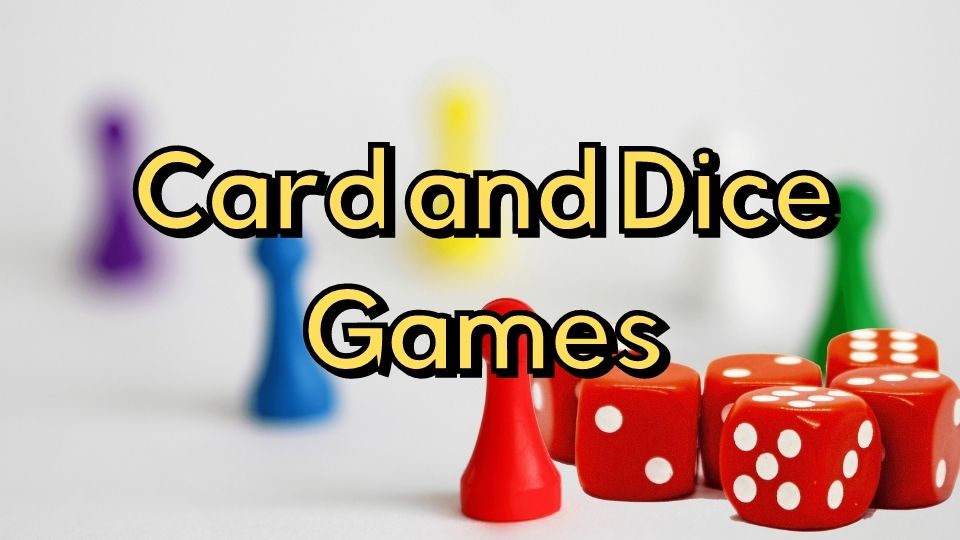
Reading card game
Ss are dealt word cards and can look at them. Go around in a circle and put a card down and say the word on the card. Ss have three chances to say the word the correct way. If they cannot they pick up the pile of cards that have accumulated on the floor. Variation: Ss are not allowed to look at their cards beforehand.
Uno cards & Jenga
Each colour is assigned a category (e.g. phonics, countries, animals etc.). Speaking Thai= pick up a card.
Go Fish
Deal out 3/5 cards to every student (can use playing or uno cards) students go around in a circle asking ‘do you have a ______’ students answer ‘yes I do’ or ‘no I don’t’. Or ‘do you have any ____?’ If the answer is ‘no’ then the student must pick up from the pile of cards in the middle. The idea is to have the as many pairs as possible.
Variation: if the students are speaking Thai, they must pick up an extra card.
Snake Game
Draw a snake on WB with divisions, then write in verbs, pronouns or any grammar point. Teams roll the dice to move, then must say a correct sentence using grammar to get the spot.
Name # Vocab
Choose category, roll dice. If roll 7, name 7 of category item.
Classic Concentration (Pairs)
Using double or paired flashcards, distribute 24 or so cards face down on the floor. Ss turn a card and say “fish” or “It’s a fish.” Then must find the first card’s partner by remembering previously turned cards. Good for vocab or “It’s a ….” vs. “It’s an…”
Have you seen my banana?
Like go fish, the idea is to get as many matches as you can. Use a deck of cards (or flash cards which have at least 2 of every object). Deal all the cards out evenly. The students go around in a circle asking ‘have you seen my ________?’ students answer ‘yes I have’ or ‘no I haven’t’ (if the students have the card they must hand it over). Then that student asks the next, and so on. The game continues until 1 student has no cards left. The student with the most pairs wins.
Dice
Divide numbers into different categories. A good alternative from when Ss get tired of Uno cards. Also can be used for grammar, give one die a subject (1= you, 2=we), and another a verb (1= like, 2= have) and students roll the die and make a question.
Phonics
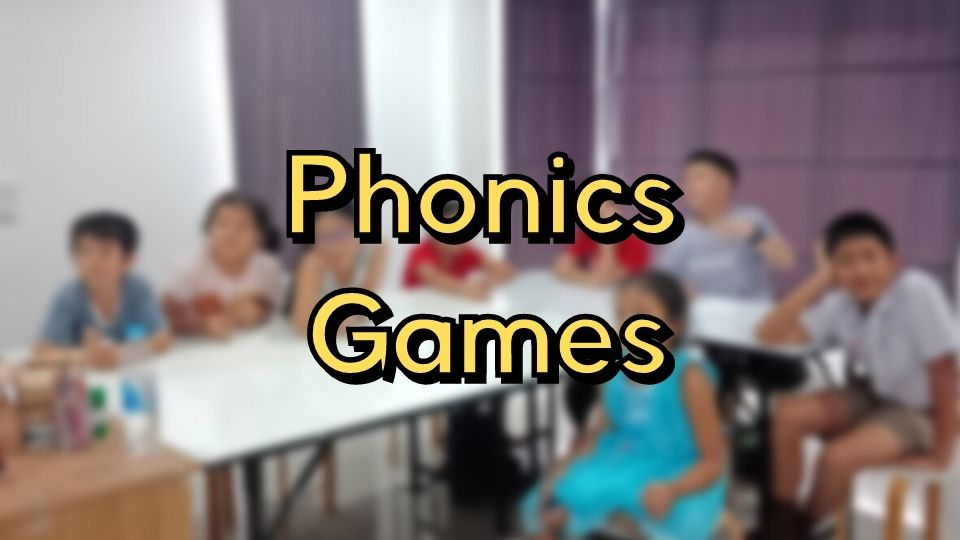
Board race
Ss in two lines face the whiteboard. T says a word, Ss must race to the board and spell it, draw it, write the first/ last/ middle letter, write short/ long vowel- everything!!
Spelling basketball
The Ss can be in 2 or 3 teams. One person from the first team must spell (or read) a word, then they throw a ball (can be wadded paper) in a basket (can be the bin). They get one point for correct spelling/reading, and one for making a basket. Then the first person from the second team goes, etc.
Swatter Game
Targets words are written randomly on the white board. Two students come up and are each given a fly swatter. T calls out a word and the first S to swat the correct word is the winner.
Variation: 1) Students are only allowed one hit.
2) Students on team can say up/ down/ left/ right, and spell the word but no touching or pointing and speaking Thai is 1 point for the other team.
3) A, B, C Teacher says a word and students slap the letter it begins with. For younger students (when first teaching the letters) write the letter you are teaching, and the previous 2 on the board, elicit words which begin with the letters –write on the board in lists, keep these lists on the board when playing the swat game (to help with recognition of the words).
Phonics Train
Ss make flashcards relating to the phonics sound they are learning. ex. short A,I,O,U,E draw a picture and write the word. Ss to form a line. The first S calls the sound and takes one step forward. The remaining Ss take turns to step forward and say the word on their flashcard. The train can weave around the room.
Around the World Reading
Ss sit in a circle, and one S is selected to begin. They stand with the person on their left, and they race to read the word on your flashcard. The loser sits down, and the winner goes to the next person on the left. The object is to travel all around the circle back to their original seat.
Down! Pass! Pick Up!
Students are dealt cards with letters or word endings on them. When you say Down, they all put one card down, with Pass they pass it to the person on their left, with Pick up they pick up the card from the right. The object is to use all your cards to make words.
Pronunciation circle
Students must correctly pronounce an entire list of words to win.
Flashcard Slap
2 sets of alphabet cards are handed out to Ss (they can’t have doubles). One S calls out a letter, and the others race to slap it if they have it. Fastest slap wins. For variations (higher level), Ss have to say a word beginning with the letter, a sentence with that word or a question with that word.
Flashcard Grab
One or two sets of alphabet cards on the floor. Two lines of Ss. T calls out a letter and the first 2 Ss race to grab it first and bring it back to T. May have to say or spell a word with the letter. For categories, S race to grab the letters to spell a word in the category and bring it back to the teacher.
Tongue Twisters
Write (or Ss write) tongue twisters and have contests for pronunciation and speed.
Steps game
Use with phonics or vocab cards. Ss line up against the wall at the back of the class. T tells them to take one step forward. T asks Ss for a word or shows them a card. If they answer correctly, they can take one step back to the wall. Steps can be increased to two or three steps forward, requiring as many steps backward to finish the game.
List Races
In teams, students must list as many Long O or whatever words as they can in a certain time period. The lists are then written on WB and repeats are crossed off until the team with the most original, correctly spelled list is the winner. Can also have them divide their lists by spelling rules (O_E/OE/OW) or Rhymes (Toe/Tow).
Vowel Cards
Divide students into teams of 5. Each S has a, e, I, o, or u. T. says words with long or short vowels (example: cat) and first student to hold up the correct letter (a) must spell the word for a team point.
Letter race
Place different letters around the room. Teachers says a word and students run to the letter that the words start with.
Identify the sound
Good to play as the students are leaving. Teacher calls a word and students identify the sound – e.g. ‘cat’ ‘short A’, depending on what has been taught (can use first/ last letters e.t.c.) The student who identifies the word correctly leaves first.
You can check out our Phonics Alphabet activities online here.
Mini Whiteboard Games
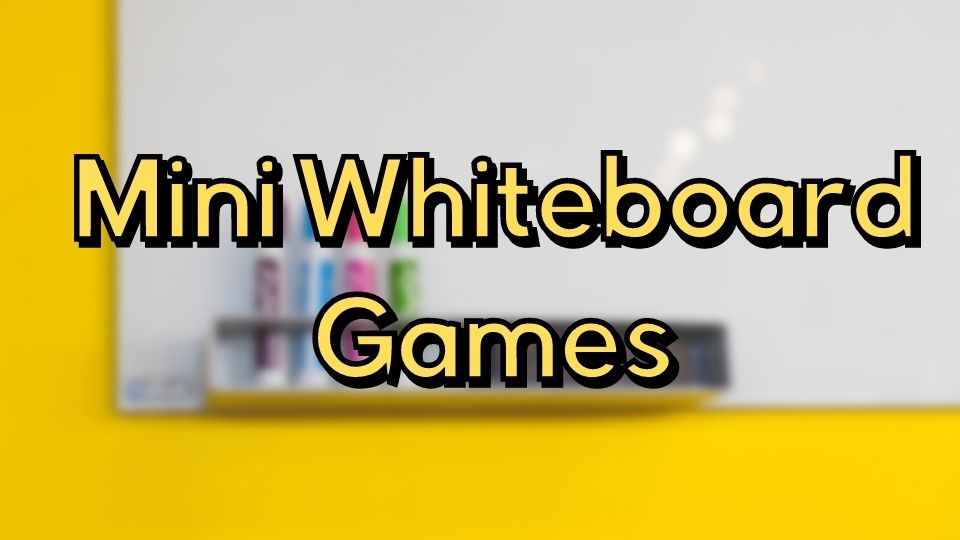
-Give a question to Ss and they write their answer on the whiteboard
-Spelling words
-Providing a word in a category (rhyming, same vowel sound, animals, etc.)
-True or false
-Correct a sentence or a word
When students are ready, “1, 2, 3, UP!”
Write words on mini whiteboards, kids run from the back, touch correct word, and pronounce for a point.
Call out a short vowel. Allow Ss one minute to write it down and give points for each word they list with that vowel sound.
The End
If you stuck around this long, congratulations and Thank You. We hope you enjoy some of our ESL classroom games. If you do like some of them, please subscribe to our YouTube channel. We have a ton of fun videos for ESL students K-6. You can check out our YouTube channel here.
